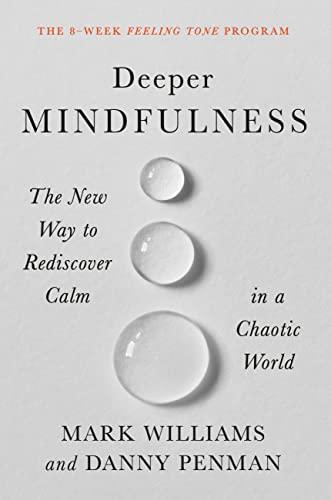278. Harnessing the Energy of Feeling Tones: Cultivating Clarity and Intentionality with Mark Williams and Dr. Danny Penman

Join me in episode 278 of the Meditation Conversation podcast as I delve into the fascinating world of feeling tones and their impact on our lives. With Mark Williams and Dr. Danny Penman as guests, we explore how feeling tones shape our thoughts, emotions, and actions, leaving us with a profound question: Are we truly in control of our own experiences? Tune in to find out, but be prepared for a mind-bending twist that will leave you questioning everything you thought you knew.
Every single moment we are aware of some slight pleasantness or unpleasantness, whether it's taste, touch, sound...and that will determine the color of our mood in the next. - Dr. Mark Williams
Welcoming Mark Williams and Dr. Danny Penman, the minds behind significant advancements in the field of mindfulness and cognitive therapy. As a professor of Clinical Psychology at Oxford University, Mark has contributed immensely to developing mindfulness-based cognitive therapy. Accompanying him is his co-author, Dr. Danny Penman, a renowned meditation teacher and accomplished writer. Winner of the British Medical Association's Best Book Award in 2014, he has brought meditation and mindfulness into the limelight. Together, they're introducing their latest endeavor, 'Deeper Mindfulness,' a reflective, insightful guide aiming to help us navigate our complex emotions.
This is their story:
 Mark Williams and Dr. Danny Penman dove into the cerulean depths of the ancient Buddhist texts, unearthing the concept of Vedana - the second foundation of mindfulness. Mark reminisced about the excitement coursing through him upon realizing that this feeling tone of pleasantness, unpleasantness or neutrality was hidden in plain sight, subtly coloring our everyday experiences. His fascination was piqued as he learned about how our brains create a simulated world, continuously predicting, adjusting and creating mental models based on this feeling tone. The idea of our emotions being coded in this subtle pleasant or unpleasant spectrum was a revelation that lit a fire in his mind, prompting further exploration.
Mark Williams and Dr. Danny Penman dove into the cerulean depths of the ancient Buddhist texts, unearthing the concept of Vedana - the second foundation of mindfulness. Mark reminisced about the excitement coursing through him upon realizing that this feeling tone of pleasantness, unpleasantness or neutrality was hidden in plain sight, subtly coloring our everyday experiences. His fascination was piqued as he learned about how our brains create a simulated world, continuously predicting, adjusting and creating mental models based on this feeling tone. The idea of our emotions being coded in this subtle pleasant or unpleasant spectrum was a revelation that lit a fire in his mind, prompting further exploration.
In this episode, you will be able to:
-
Discover the profound impact of mindfulness meditation on your mental health.
-
Learn how to weave kindness and compassion into your daily mindfulness routine.
-
Unearth methods for navigating trauma-centric mindfulness, setting a secure foothold for beginners in this practice.
-
Delve into the fascinating transformation of meditation practices in Western society.
-
Find out about the transformative eight-week program that will catapult your journey of cultivating mindfulness, as discussed in the book.
Kindness and Compassion in Meditation
Cultivating kindness and compassion is a key aspect of mindfulness and meditation. Particularly in the often driven and competitive Western culture, it's critical to integrate these attitudes into our meditation practice. By moving at our own pace and being kind to ourselves, we can make substantial progress in our mindfulness journey. Mark and Danny underscore the importance of cultivating kindness and compassion towards oneself. They acknowledge that this attribute, although well-known in Eastern traditions, has often been overlooked in Western meditation practices. They reinforce that self-compassion is essential for effective progress in mindfulness and provides a deeper dimension to meditation.
The Significance of Feeling Tones
Feeling tones or "vedanas" hold a vital position in how we perceive life. They swiftly categorize every moment as pleasant, unpleasant, or neutral, influencing our thoughts, feelings, and actions even before they enter our conscious awareness. Being aware of these feeling tones can give us more control over our responses, allowing us to savor the positive without getting too attached and let the negative have its moment without resistance. These sensations color our experiences and contribute to the narrative of our life, affirming that every moment of our existence holds significance. In the podcast, Mark Williams and Dr. Danny Penman share some eye-opening insights about how feeling tones shape our perception of reality. Our brains construct predictive models to create a simulated world, within which feeling tones serve as a core mechanism. They illustrate how these tones can influence our judgements and affect the stories we tell ourselves.
Mindfulness Practices for Balancing Feeling Tones
By incorporating mindfulness practices into our lives and being attentive to our feeling tones, we can mitigate their influence on our mental wellbeing. These practices help us to complete our experiences by taking into account the physical, emotional, and mental aspects of our lives. Mindfulness exercises provide tools for exploring feeling tones through the body, sounds, thoughts, and feelings, leaving us feeling grounded and balanced. In the podcast, Mark and Danny suggest several mindfulness exercises from their book to help individuals navigate their feeling tones. They discuss the importance of grounding techniques, noticing the mind's tendencies, and exploring feeling tones without resistance. They stress that understanding and working with our feeling tones allows us to have a greater sense of control and balance in our lives.
The resources mentioned in this episode are:
-
Check out Mark Williams and Dr. Danny Penman's new book, Deeper Mindfulness, which explores feeling tones and provides practical exercises to deepen your mindfulness practice.
-
Visit the website of Komuso, a necklace that helps you reduce stress and increase focus. Use promo code KARAGOODWIN15 for a 15% discount.
-
Explore the partners of The Meditation Conversation podcast on https://www.soulelevationpodcast.com for more resources and tools to support your spiritual revolution.
Timestamped summary of this episode:
00:00:13 - Introduction,
This episode features Mark Williams and Dr. Danny Penman, authors of "Mindfulness: Finding Peace in a Frantic World" and "Deeper Mindfulness." They discuss the concept of feeling tones or vedanas and how it influences our thoughts, emotions, and actions.
00:03:22 - The Significance of Feeling Tones,
Feeling tones are the categorization of experiences as pleasant, unpleasant, or neutral. This categorization happens at a preconscious level and influences our entire lives. The feeling tone is the foundation for our thoughts, emotions, and behaviors, yet we often remain unaware of its influence.
00:07:57 - The Neuroscience of Feeling Tones,
Neuroscience research shows that feeling tones are a core process in the brain's creation of our perceived reality. It is not localized to a specific part of the brain but rather a configuration of brain networks. The balance between left and right brain activity plays a role in the experience of pleasantness or unpleasantness.
00:12:20 - Dimensionality of Feeling Tones,
Feeling tones exist on a dimensional scale, ranging from extreme pleasantness to extreme unpleasantness, with a zone of indifference in the middle. Unpleasant experiences often lead to resistance and pushing away, while pleasant experiences can evoke attachment but also a sense of impermanence. Cultivating the skill of savoring positive moments without attachment is important.
00:16:27 - Arguing and Bargaining with Pleasantness and Unpleasantness
In this chapter, the conversation explores the concept of arguing and bargaining with pleasantness and unpleasantness. They discuss how the mind always wants to get involved and do something when faced with these feelings, rather than allowing them to pass by.
00:17:48 - The Cultural Influence on Acceptance
The conversation delves into the cultural differences in accepting pleasant and unpleasant experiences. They suggest that British culture tends to reach a threshold of not accepting the pleasant, while American culture may be better at accepting good things. They also share personal experiences related to this cultural influence.
00:18:57 - The Brain's Constant Action
The conversation highlights the findings of neuroscientists regarding the brain's constant activity. They explain that the brain is always making predictions, sorting out memories, and creating counterfactuals of possible actions. Action is seen as a fundamental aspect of the mind and plays a crucial role in how we perceive the world.
00:20:31 - No Action Needed Right Now
The conversation explores the concept of "no action needed right now" in relation to feeling tone. They discuss how the mind creates numerous actions and scenarios that it may never actually take. By acknowledging that no action is needed in the present moment, it can help calm the mind and provide insight into its busy nature.
00:24:37 - Living in an Accurate Simulation
The conversation emphasizes the importance of feeling tone (vedana).
00:32:45 - The Benefits of Downloads and Streamable Content,
The guests discuss how the shift from CDs to downloads and streamable content has allowed for more flexibility in meditation practices. They emphasize the importance of offering shorter and longer meditation options to cater to different lifestyles and preferences.
00:33:56 - Trauma-Sensitive Mindfulness,
The conversation introduces the concept of trauma-sensitive mindfulness, which encourages individuals to meditate at their own pace and be mindful of any difficult memories or experiences that may arise. They highlight the importance of providing choices and creating a safe space for meditation practice.
00:34:45 - Mind Wandering as a Gymnasium Equipment,
Mind wandering is compared to gym equipment, highlighting that it is a natural part of meditation and not a mistake. The guests emphasize the value of appreciating the mind's constant work and expressing gratitude for its efforts before refocusing on the breath or body.
00:36:07 - Kindness and Compassion in Meditation,
The conversation explores the role of kindness and compassion towards oneself in meditation. They note that these qualities are crucial for progress and acknowledge that Western culture often emphasizes pushing oneself forward rather than allowing things to unfold naturally.
00:37:24 - Program Options and Resources,
The guests discuss the options for engaging with the meditation program. The book contains the full eight-week program, with the flexibility to complete it over a longer period if desired. Online classes are also available through the Oxford Mindfulness Foundation for those who prefer guided instruction.
Connect with me here:
Categories
- Awakening (95)
- ET (26)
- Law of Attraction (5)
- beekeeping (1)
- Angels (11)
- EnergyHealing (49)
- Abundance (9)
- Brain (15)
- Health (49)
- Crystals (8)
- Music (11)
- Divorce (3)
- Art (9)
- Ascension (46)
- MentalHealth (34)
- Cancer (5)
- Shaman (12)
- Heart (9)
- sobriety (2)
- Psychic (33)
- Cacao (1)
- Medium (3)
- yoga (11)
- humandesign (1)
- NDE (8)
- Death (3)
- DNA (1)
- Animals (5)
- Nature (1)
- Energy (1)
- Paranormal (1)


0 comments
Leave a comment
Please log in or register to post a comment